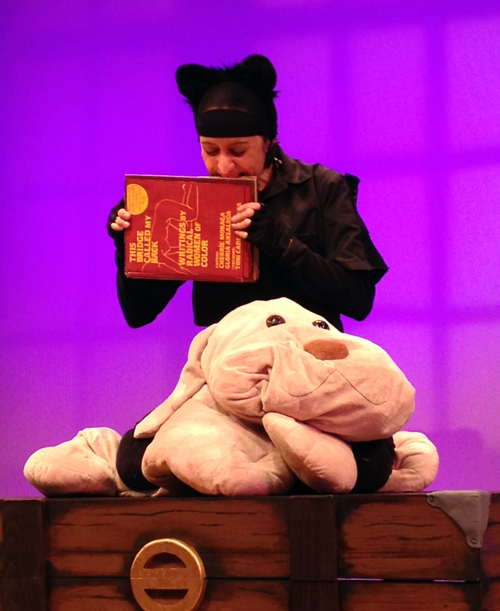
When my best friend’s partner said there was a play about “queer animals” featuring an undocumented cat that I simply had to see, I was wary. Frankly, I didn’t think the play would be any good. But I agreed to go anyway, reservations be damned, because sometimes revelations occur from doing the unexpected.
My friends and I made our way to The Beast of Times on its second to last showing in Los Angeles. Written and performed by award-winning performance artist Adelina Anthony, the play’s heavy-handed description — “a satirical and queer allegory [that] explores the contradictions and pains of coming to political consciousness as ‘Other’ in a world where environmental and ethnic diversity are quickly becoming passé” — obscures the fact that Anthony’s off-kilter sensibility is actually quite accessible and incredibly funny. Similar to David Sedaris’ Squirrel Seeks Chipmunk: A Modest Bestiary, the characters in The Beast of Times reflect the idiosyncrasies of what it means to be a human being.
Once the audience became comfortable inhabiting Anthony’s bemusing world, the play took a serious turn when the aforementioned cat reveals the scar of her ovariohysterectomy — or what we humans call ‘spaying’. “You will not be having any sex or offspring,” a turtle tells the cat. “They cut the fire straight out of you.”
The cat begins hissing, twitching, and pacing. She hacks angrily and uncontrollably, as though coughing up a hairball. Before her meltdown is complete, the audience learns she is having a “soul memory,” and the cat begins to speak:
1928: I am a Native girl, a child who will barely reach puberty when they come for me. Canadian officials will sterilize entire tribes. 1944: In Puerto Rico I will have la operación. For decades, a third of our female population will endure forced sterilization by the US Empire. 1965: I will be poor again, so you can count me among the one million women who will be sterilized by the Brazilian government …
The monologue continues to trace nearly a hundred years of international reproductive atrocities committed against poor women of color by their governments. It’s hard to explain how a woman wearing cat ears and thrashing about on stage could move me to tears, but it did. It reminded me that I had forgotten to allow myself to feel pain, but the power of art is it can break through your defenses and force you to feel once again.
Like many people, I have become desensitized to certain kinds of violence and degradation, particularly the kinds that disproportionately affect women. The cat’s affecting monologue made me feel as though I were having my own soul memory. I was experiencing the pain of things that had never happened to me, but still managed to leave deep wounds. These tragic events flooded my mind:
Abeer Qassim Hamza al-Janabi. After they’d killed her family, including her six-year-old sister, five American Army soldiers raped and killed a fourteen-year-old girl in Iraq. We call this the Mahmudiyah killings.
Jyoti Singh Pandey. On the way home from the movies, a mob of men fatally raped a twenty-three-year-old medical student on a bus in India. We call this the Delhi gang-rape case.
Anonymous victim. In Ohio, an unconscious sixteen-year-old girl was dragged from one location to another and repeatedly raped for six hours by two high school football players, while fellow students uploaded images of the assault to social media sites. We call this Steubenville.
These stories are never-ending, and they became overwhelming while watching the cat’s scene in Anthony’s play. That week, a member of the paparazzi opted to snap photos instead of intervene when millionaire art collector Charles Saatchi repeatedly choked his wife, celebrity chef Nigella Lawson, during a twenty-seven-minute altercation at an exclusive restaurant in London. The morning of the day I attended the play, a woman was chased down and stabbed to death by her estranged husband in an affluent Los Angeles suburb — the restraining order and her reports to the authorities failed to keep Michelle Kane safe. There comes a point when we simply have to shut ourselves off, but what then is the cost?
Something about Anthony’s play breathed life back into me. Her words stoked an internal fire I thought I’d lost that felt a little like rage and passion, but also like remembrance and gratitude. I don’t know if the world will ever be a safe place for women, but I do know that silence is a form of complicity, detachment, and resignation — and that is unacceptable.
When violence against women is everywhere we turn, we must choose action not apathy. According to the United Nations, up to seventy percent of women worldwide experience gender-based violence in their lifetimes — most often at the hands of her partner. Violence is the leading cause of death and disability to women between the ages of fifteen and forty-four, more than cancer, malaria, traffic accidents, and war combined. It is time for our stories of survival to counteract our fear. Anthony’s powerful storytelling was a catalyst for me. It broke through my catatonia and provided a vital antidote to being resigned to life in a beastly time.
- Follow us on Twitter: @inthefray
- Comment on stories or like us on Facebook
- Subscribe to our free email newsletter
- Send us your writing, photography, or artwork
- Republish our Creative Commons-licensed content
